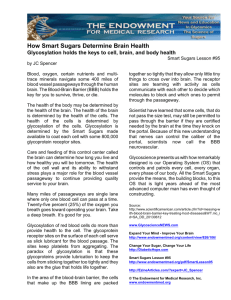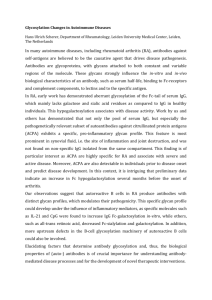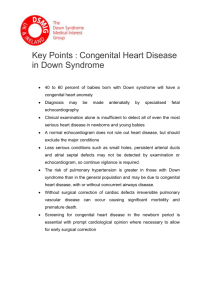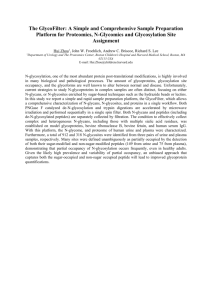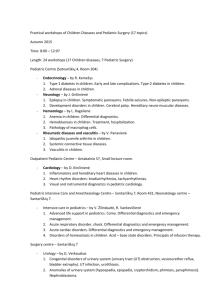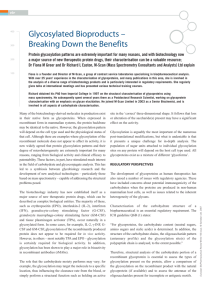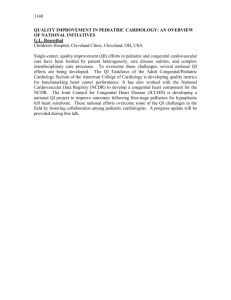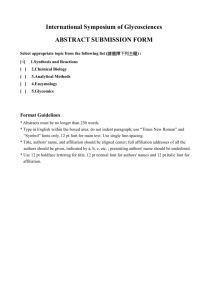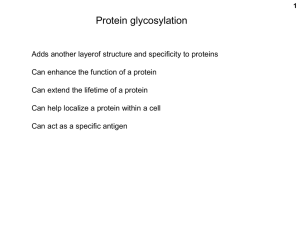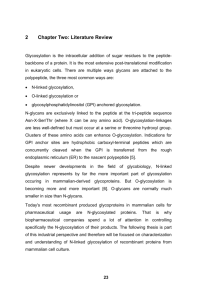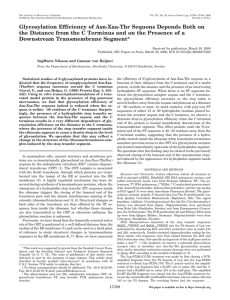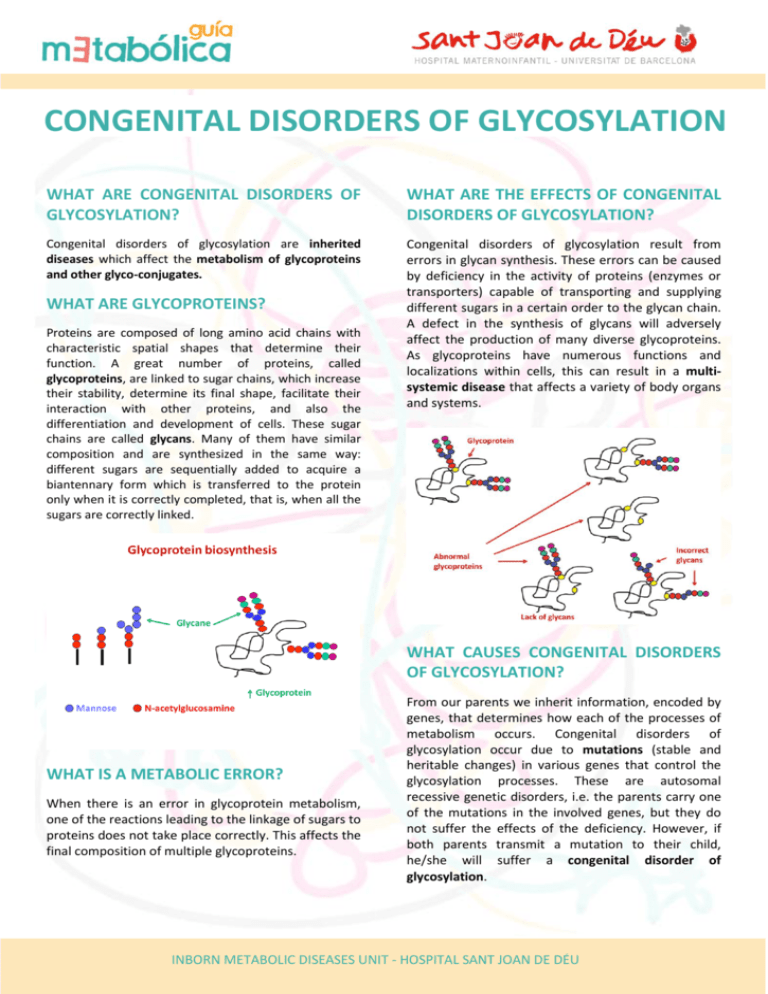
CONGENITAL DISORDERS OF GLYCOSYLATION
WHAT ARE CONGENITAL DISORDERS OF
GLYCOSYLATION?
WHAT ARE THE EFFECTS OF CONGENITAL
DISORDERS OF GLYCOSYLATION?
Congenital disorders of glycosylation are inherited
diseases which affect the metabolism of glycoproteins
and other glyco-conjugates.
Congenital disorders of glycosylation result from
errors in glycan synthesis. These errors can be caused
by deficiency in the activity of proteins (enzymes or
transporters) capable of transporting and supplying
different sugars in a certain order to the glycan chain.
A defect in the synthesis of glycans will adversely
affect the production of many diverse glycoproteins.
As glycoproteins have numerous functions and
localizations within cells, this can result in a multisystemic disease that affects a variety of body organs
and systems.
WHAT ARE GLYCOPROTEINS?
Proteins are composed of long amino acid chains with
characteristic spatial shapes that determine their
function. A great number of proteins, called
glycoproteins, are linked to sugar chains, which increase
their stability, determine its final shape, facilitate their
interaction with other proteins, and also the
differentiation and development of cells. These sugar
chains are called glycans. Many of them have similar
composition and are synthesized in the same way:
different sugars are sequentially added to acquire a
biantennary form which is transferred to the protein
only when it is correctly completed, that is, when all the
sugars are correctly linked.
WHAT CAUSES CONGENITAL DISORDERS
OF GLYCOSYLATION?
WHAT IS A METABOLIC ERROR?
When there is an error in glycoprotein metabolism,
one of the reactions leading to the linkage of sugars to
proteins does not take place correctly. This affects the
final composition of multiple glycoproteins.
From our parents we inherit information, encoded by
genes, that determines how each of the processes of
metabolism occurs. Congenital disorders of
glycosylation occur due to mutations (stable and
heritable changes) in various genes that control the
glycosylation processes. These are autosomal
recessive genetic disorders, i.e. the parents carry one
of the mutations in the involved genes, but they do
not suffer the effects of the deficiency. However, if
both parents transmit a mutation to their child,
he/she will suffer a congenital disorder of
glycosylation.
INBORN METABOLIC DISEASES UNIT - HOSPITAL SANT JOAN DE DÉU
WHAT HAPPENS WHEN A CHILD IS BORN
WITH A CONGENITAL DISORDER OF
GLYCOSYLATION?
A child with a congenital disorder of glycosylation may
already be born with health problems, because of the
diversity of glycoproteins and body processes which
can be affected.
However, depending on the origin and severity of the
disorder, the child’s clinical features and the evolution
of the disease can vary greatly.
IS
THERE
A
CONGENITAL
GLYCOSYLATION?
TREATMENT
DISORDERS
At present there is only treatment for some CDG types
which are not very common (i.e. PMI-CDG, SLC35C1CDG, PIGMCDG PIGMCDG).
However, a lot of research is in progress all over the
world in order to achieve effective treatment for the
most common types of the disease. In any case,
supportive treatments are available to ameliorate the
quality of life of the patients.
HOW ARE CONGENITAL DISORDERS OF
GLYCOSYLATION DIAGNOSED?
The diagnosis is based on the observation of a number
of signs and symptoms of the disease (abnormal
distribution of body fat, strabismus, etc…together
with failure to thrive, and other multiorganic
symptoms, especially neurological).
There are some biochemical markers (such as the
study of abnormal serum transferrin profiles) which
are useful to diagnose the diseases after the clinical
suspicion. These markers also allow the differentiation
between the different types of the disease. However,
the most frequent defect is the PMM2-CDG (former
CDG type Ia). It is caused by deficient activity of the
enzyme phosphomannomutase2 (PMM2), which is
needed to supply a sugar, mannose, to the
glycoproteins in the synthetic process.
FOR
OF
Translation
American School of Barcelona
Passeig Sant Joan de Déu, 2
08950 Esplugues de Llobregat
Barcelona, Spain
Tel: +34 93 203 39 59
www.hsjdbcn.org / www.guiametabolica.org
© Hospital Sant Joan de Déu. All rights reserved.
The confirmation of the glycosylation defect allows
the genetic counseling to the families and the prenatal
diagnosis if required.
INBORN METABOLIC DISEASES UNIT - HOSPITAL SANT JOAN DE DÉU

